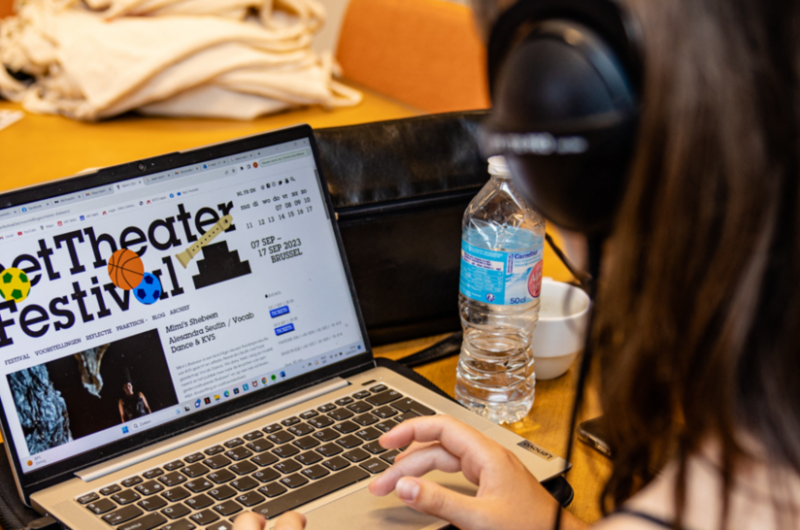
Stage: communicatie & sociale media
13 Maa 2024
ma 09 sep 2019
In her State of the Youth speech, Luanda Casella noted that “We live surrounded by a fog of comments and comments on comments, of criticism and criticism on criticisms” in which there’s nothing original. Merely copies, variations, and versions of something that’s supposedly original (whatever that means). Perhaps no other performance at Het TheaterFestival delves into these problems as effectively as True Copy by BERLIN, in which the audience is forced to ask if we really value originality and authenticity as much as we think we do.
Liam Rees
True Copy tells the story of master art forger Geert Jan Jansen, which almost defies belief. The Dutchman created prodigious reproductions of 15 vastly different painters with such skill that many experts couldn’t tell the difference and he was only foiled because of a simple yet crucial spelling mistake rather than any slip-up in his technique. The story fascinated Yves Degryse and Bart Baele, who form BERLIN, and they made True Copy as part of their new cycle of work: Horror Vacui [the fear of emptiness].
In conversation with Degryse, he says: ‘We started the project because, it all starts from the basic idea: why are we so attached to the truth? Imagine you’re standing in a museum watching a painting which touches you and imagine then that a person whispers it’s not the real one but a perfect copy by Geert Jan Jansen. Then the question is: why is everything devalued? On every level, emotional, financial, it never gets better when you hear it’s not the real one. Why?’
The Golden Age of the Docudrama
As a company, BERLIN is characteristically tricksy frequently blurring the lines between truth and fiction, often working with local casts, using their stories and playing mind-games with the audience. True Copy is no exception, in fact Jansen appeared in an earlier BERLIN show Perhaps all the Dragons but after two years of research and interviews he finally has his own show. When asked about their creative process with documentary subjects, Degryse is keen to point out that the interviewees are an integral part of the process as they “are our voices, they are the text of the performance so it’s much better to create an environment where they can talk as they want to and explain what they want to explain.”
With the rise of identity politics in theatre and people questioning whose story they are allowed to tell it seems that the documentary format may be the ideal tool to navigate such questions. At once it manages to ground the performance in something undeniably real whilst also making us aware of how that reality and how authenticity can be manipulated. However this is taken to another extreme in True Copy in which we observe skill involved in forging a Picasso, mediated by livestreams, cameras and eventually auctioned off to an audience member. We know it’s not original but does that really matter?
But is it art?
‘Geert Jan Jansen is a master in what he did’, says Degryse. ‘He was able to copy 15 masters which is already a masterpiece. [yet] He himself distinguishes very clearly what he did as an art forger, for him that is not art. It is not kunst but a kunstje, which in English is like a trick you can do very well.’
Is it possible that the show itself is a kind of kunstje? After all it takes an original story, reproduces it and revels in playing tricks with the audience’s preconceptions of what is real and what we value. Degryse is careful to give away too many details or concrete answers but affirms ‘the tricks in the performance are only made to tell the story, it’s actually to stay very close to the content.’ Indeed the form and the content are symbiotic here, leading to audience reactions that vary from some indifferent to the apparent emptiness and others proclaiming it as genius – a bit like modern art that reveals more about the watcher than the art itself.
‘Good artists copy. Great artists steal’ – Picasso
Jansen’s exploits caused a similar problem in the art world, resulting in an estimate that approximately 20% of all art in galleries are actually forgeries. Regardless of what you may think of his work, it exposes the internal crisis of modern consumer capitalist society. We’re bombarded with near-identical adverts that encourage us to be original individuals by buying into and copying their brands. On the internet, everything can be infinitely copied, pasted, reused and remixed. Originality has never been less important and Jansen is certainly on to something when he says ‘At the end they always want a performance.’ Theatre isn’t theatre without some suspension of disbelief, in fact it may well be the fakest art form that there is.
Towards an untrue theatre
True Copy shows that we don’t always need theatre to be original or totally true. Now the question is what comes next? In her State of the Union speech Sarah Moeremans provided us with a radical potential answer:
‘I am looking for more untrue theatre, a theatre that appeals to my ability to contrast, connect, associate and read characters that are in an uncommon context. I believe — and that is a paradox, I know — in an unbelievable theatre, a theatre where untrue tracks of thought are walked on, which inspires me to engage in ideas that I didn’t know existed, thereby stretching my reality and the unimaginable becomes conceivable.’
Maybe then we’ll find something truly original.
